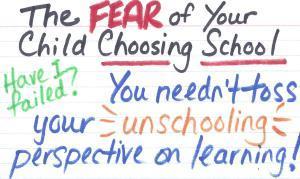The Fear of Your Child Choosing School
 What if my child wants to go (back) to school?
What if my child wants to go (back) to school?
It’s a fear I’ve seen come up online pretty regularly, and one I experienced myself a couple of times in our first few years.
I still remember it clearly, that rush of fear and adrenaline when one of my kids mentioned they were considering school. All of a sudden, questions were spinning through my mind like a tornado: Why are they interested in school? Is our unschooling home not good enough? Is this a judgement of me? Have I failed them? Will those who thought I was crazy to take them out of school see it as proof they were right? What if they go to school and don’t fit in? What if they are really behind? Will teachers and other parents look down on me as an bad parent?
I had enough presence of mind left to realize that when I’m feeling judged and defensive is not a good time to try to have a conversation (“What?! Why?”) or to make snap decisions (“You’re not allowed to go to school!”).
But it is a good time to breathe. Deeply. Slowly. Have a glass of water or a cup of tea. Let some time pass. Do the things that work for me to dissipate the adrenaline and move into a clearer frame of mind.
And then, when I had a moment here and there, I asked myself, “What was I really scared of?”
It wasn’t easy, or pretty, to tease out the many knots that were woven into my fear, but eventually the thought stopped sending me into a tailspin (although sometimes I still needed to talk myself through a knot or two again, and again). So I thought we could dig into some of those knots together.
One knot was the fear of being judged by others
Even though choosing unschooling for my family was pretty easy (it made sense to us and my kids were excited to be home), it was sometimes challenging once I stepped outside. It takes a lot of thought and energy and commitment to choose an unconventional lifestyle. Extended family and friends directly question your choice to keep your children out of school. And then there’s the ever-present societal messages, like “children need to stay in school or they’ll never amount to anything,” wafting around you. With that added pressure, we can often feel like we have something to prove to our naysayers, and that can pull our focus away from our family.
Most of us have been conventionally raised to see a reversal as a condemnation of our initial decision: If you make a choice, and then in the future make the seemingly opposite choice, those around you are apt to conclude that your first choice must have been wrong. That you were wrong. You made a mistake. You failed this unschooling experiment. We feel transported right back to our childhood where mistakes were a bad thing.
In that rush of shame and fear of feeling judged as “wrong,” we often forget what we’ve discovered about learning since starting our unschooling journey: that judgement deeply interferes with real learning (our learning too). That when things take an unexpected turn (most often a much better description of a situation than “wrong”), we can learn so much. And our experience is incorporated into our future choices. Real and lasting learning. I realized maintaining that atmosphere is my goal. Not being “right” in the eyes of others.
Then I asked myself, do extended family and friends—people observing, but not living, our lives—really know what’s going on? Is it as black and white, as right and wrong, as they seem to think? Soon I realized the reality I see is much different. Putting myself in their shoes I can see why they might draw the conclusions they do, but that doesn’t mean they are right. I understand the bigger picture of the learning that is happening in our family, and how my child potentially choosing to go to school isn’t a mark of unschooling failure so much as an extension of the learning lifestyle we have chosen.
So again, as when we first chose unschooling, I could choose to be strong in my family’s choices.
Another knot was the fear of failing my children
Was I failing at unschooling?
It’s good to regularly ask ourselves if we are doing all we can to support our children. Just remember to ask the question from their perspective—it’s not, “Do I think I’m supporting my children?” but “Do my children feel supported?” A subtle but important distinction.
So if your child expresses an interest in school, what if you chose to explore your child’s curiosity about school with them?
Over the years I’ve heard stories where what the children were actually interested in was riding a bus, or eating from a cool lunchbox, or playing with friends at recess, or doing workbooks etc. In their mind, those activities were associated with going to school, so that’s what they asked for. School might just be the answer they’ve jumped to, not the root of the interest itself.
If that’s the case, you may discover ways to satisfy those interests without resorting to registering for school, like taking bus rides around town (have fun figuring out maps and bus schedules together), letting them pick out a lunch box and filling it with fun food (play with finger foods, bento boxes etc), making more regular play dates with friends (maybe host weekly game drop-ins, or plan a fun themed party), taking them to the bookstore to pick out some interesting workbooks (and letting them use them however they’d like).
Whenever I became concerned that one of my children may want to go to school, instead of wallowing in my fear of failure, I used it as a trigger to ask myself if our unschooling lives were as interesting as they could be. That helped me shift my perspective from negative to positive, reminding me of this lovely quote from Anne Ohman:
How can I connect with my children today, expand their worlds, bring joy into their lives, nurture and encourage what they love to do?
A third knot was the fear of bringing school into our lives
As I dove into this fear, I realized that even if they do choose to try out school, they would be going with a very different perspective than the vast majority of students. The school experience is so different when our children choose to be there because, for them, school isn’t compulsory. We can let them know that if they find it’s not for them, they can choose to stay home again.
The question for me became, how much does school need to permeate our lives?
If they make the choice to be there, we can support them in getting out of the experience what they are looking for. Our perspective on the experience can stay firmly in sync with them—we don’t need to “shift allegiances.” We can continue to see the whole world as our learning playground. We don’t need to become the school system’s eyes in our own home.
If you think you might feel a pull to do that, to begin nudging your child to finish their homework and judging their test marks, ask yourself why.
Maybe you feel that your unschooling will be judged by how well your child now does in school. That teachers will look down on your child for not being at “grade level.”
Well, maybe they aren’t at grade level as per the school’s curriculum, but that doesn’t mean they haven’t been learning. I bet they know lots of things that, even though they aren’t part of the curriculum, are important pieces of their world, of their life. They probably already know things that will come up in the next grade, or the next. You don’t need to buy into the attitude that what’s in the curriculum is far more important than what isn’t.
Just because school is in the mix, you don’t need to toss the philosophical perspective on learning you’ve developed on your unschooling journey.
For example, the idea of lifelong learning. That learning can happen at any age, that all learning is valuable in building our understanding of the world. With unschooling, the parameters of your child’s learning were wide—much wider than a curriculum. That doesn’t have to change.
If you think of school as a tool your child is trying out as they pursue their goals, you can keep the lifelong learning perspective rather than zeroing in on learning defined by grade. Curriculum is just a tool the school system chooses for efficiency, it’s not the definitive word on what to learn. That constellation of knowledge and skills is unique to each of us.
Or maybe you’re feeling a tug to make school as unhappy an experience as possible in hopes they’ll choose to come back to unschooling. If I recall, that was my first reaction to the thought of one of my kids returning to school. For example, nagging them to do homework with the ulterior motive of making school seem annoying isn’t being very supportive nor considerate of your child’s choices. If not doing homework has consequences, those are school consequences, they needn’t be yours.
It didn’t take long for me to realize that my urge to emphasize school’s unpleasant side was a reactionary stance rooted in the feeling that their choice would somehow be an explicit rejection of our unschooling lives up to that point. Would that be helpful? No, that would make their choice all about me, not about them. I would be the one adding judgement to the mix.
Why might we tempted to do that? Because that’s what we grew up with. But our unschooling children don’t live every day in a pervasive cloud of judgement. They feel in control of their own lives, not manipulated through judgement and shame by those around them. Instead, their choice to try school will be rooted in their current perspective, their goals, and the various ways they might meet them.
And adding school to your lives, with its system of grading and sorting, needn’t shift your perspective on judgement—it’s not about going back to old ways. Especially if you’re concerned that school may not a be supportive environment for your child, keeping the judgement out of your conversations and the communication channels open is key. If you make the choice to try out school about anything more than them exploring their options, it can quickly get tangled up in a power struggle.
If your child gets the impression that you consider their school choice as them choosing school over you, you set up any future choice of theirs to leave school and return home as your “win” and their “failure.” And it’s so much harder to make a choice that feels like failure, isn’t it? Don’t do that.
My youngest is seventeen and in a few months, school of some sort (public, private, or home) will no longer be compulsory, so it feels pretty safe to say that in the end, none of my children chose to return to school.
But digging into these fears and understanding their roots meant that I spent the last bunch of years not stressed about the possibility.



